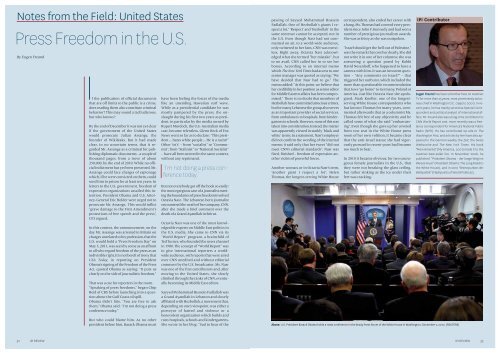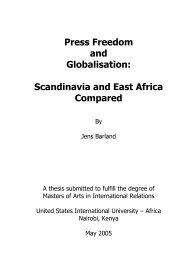FOCUS ON THE AMERICAS - International Press Institute
FOCUS ON THE AMERICAS - International Press Institute
FOCUS ON THE AMERICAS - International Press Institute
Create successful ePaper yourself
Turn your PDF publications into a flip-book with our unique Google optimized e-Paper software.
Notes from the Field: United States<br />
<strong>Press</strong> Freedom in the U.S.<br />
By Eugen Freund<br />
If the publication of official documents<br />
that are off limits to the public is a crime,<br />
does reading them also constitute criminal<br />
behavior? This may sound a tad ludicrous,<br />
but who knows?<br />
By the end of December it was not yet clear<br />
if the government of the United States<br />
would prosecute Julian Assange, the<br />
founder of Wikileaks. But it had made<br />
clear, in no uncertain terms, that it regarded<br />
Mr. Assange as a criminal for publishing<br />
diplomatic documents - a couple of<br />
thousand pages, from a trove of about<br />
250,000, by the end of 2010. While no official<br />
indictment has yet been presented, Mr.<br />
Assange could face charges of espionage<br />
which, if he were convicted on them, could<br />
send him to prison for at least ten years. In<br />
letters to the U.S. government, freedom of<br />
expression organizations assailed this intention.<br />
President Obama and U.S. Attorney-General<br />
Eric Holder were urged not to<br />
prosecute Mr. Assange. This would inflict<br />
“grave damage to the First Amendment's<br />
protections of free speech and the press”,<br />
CPJ argued.<br />
In this context, the announcement, on the<br />
day Mr. Assange was arrested in Britain on<br />
charges unrelated to his profession, that the<br />
U.S. would hold a “<strong>Press</strong> Freedom Day” on<br />
May 3, 2011, was seen by some as an affront<br />
to all who regard freedom of the press as an<br />
indivisible right. It is not bereft of irony that<br />
USA Today, in reporting on President<br />
Obama’s signing of the Freedom of the <strong>Press</strong><br />
Act, quoted Obama as saying: “It puts us<br />
clearly on the side of journalistic freedom.”<br />
That was a cue for reporters in the room.<br />
“Speaking of press freedoms,” began Chip<br />
Reid of CBS before launching into a question<br />
about the Gulf Coast oil spill.<br />
Obama didn't bite. “You are free to ask<br />
them,” Obama said. “I'm not doing a press<br />
conference today."<br />
But who could blame him. As no other<br />
president before him, Barack Obama must<br />
have been feeling the forces of the media<br />
like an unending Hawaiian surf wave.<br />
While as a presidential candidate he was<br />
mostly pampered by the press, the onslaught<br />
during his first two years as president,<br />
in particular by the media owned by<br />
Rupert Murdoch, the U.S.-Australian media<br />
czar, became relentless. Glenn Beck of Fox<br />
News went so far as to declare: “This president<br />
... hates white people ... He is a racist!”<br />
Other ‘ist’s’ – from “socialist” to “Communist”,<br />
from “Stalinist” to “National Socialist”<br />
- have all been uttered in the same context,<br />
without any reprimand.<br />
‘I’m not doing a press conference<br />
today.’<br />
But not everybody got off the hook so easily:<br />
the most egregious case of a journalist meeting<br />
the boundaries of press freedom involved<br />
Octavia Nasr. The Lebanese-born journalist<br />
encountered the wrath of her company, CNN,<br />
after she made a brief comment over the<br />
death of a Grand Ayatollah in Beirut.<br />
Octavia Nasr was one of the most knowledgeable<br />
experts on Middle East politics in<br />
the U.S. media. She came to CNN via its<br />
“World Report” program, a brainchild of<br />
Ted Turner, who founded the news channel<br />
in 1980. The concept of “World Report” was<br />
to give international reporters a worldwide<br />
audience, with reports that were aired<br />
over CNN unedited and without editorial<br />
comment by the U.S. broadcaster. Ms. Nasr<br />
was one of the first contributors and, after<br />
moving to the United States, she slowly<br />
climbed through the ranks of CNN, eventually<br />
becoming its Middle East editor.<br />
Sayyed Mohammad Hussein Fadlallah was<br />
a Grand Ayatollah in Lebanon and closely<br />
affiliated with Hezbollah, a movement that,<br />
depending on one’s viewpoint, was either a<br />
purveyor of hatred and violence or a<br />
benevolent organization which builds and<br />
runs hospitals, schools and kindergartens.<br />
She wrote in her blog: "Sad to hear of the<br />
passing of Sayyed Mohammad Hussein<br />
Fadlallah. One of Hezbollah's giants I respect<br />
a lot.” ‘Respect’ and ‘Hezbollah’ in the<br />
same sentence cannot be accepted, not in<br />
the U.S. Even though Nasr had not commented<br />
on air, to a world-wide audience,<br />
only twittered to her fans, CNN was merciless.<br />
Right away, Octavia Nasr acknowledged<br />
what she termed "her mistake", but<br />
to no avail. CNN called her in to see her<br />
bosses. According to an internal memo<br />
which The New York Times had access to, one<br />
senior manager was quoted as saying: "We<br />
have decided that Nasr had to go." The<br />
memo added: "At this point, we believe that<br />
her credibility in her position as senior editor<br />
for Middle Eastern affairs has been compromised."<br />
There is no doubt that members of<br />
Hezbollah have committed atrocious crimes,<br />
but for many Lebanese the group also serves<br />
as an important provider of social services,<br />
from ambulances to hospitals, from kindergartens<br />
to schools. However, none of this was<br />
taken into consideration. Instead, the matter<br />
was apparently viewed in starkly 'black and<br />
white' terms. In a statement, Nasr’s employer<br />
did not confirm the wording of the internal<br />
memo; it said only that her tweet "did not<br />
meet CNN’s editorial standards". Nasr was<br />
fired, finished - freedom of expression another<br />
victim of powerful forces.<br />
Another woman, or in Octavia Nasr’s term,<br />
“another giant I respect a lot”, Helen<br />
Thomas, the longest-serving White House<br />
correspondent, also ended her career with<br />
a bang. Ms. Thomas had covered every president<br />
since John F. Kennedy and had won a<br />
number of prestigious journalism awards.<br />
She was as feisty as she was outspoken.<br />
“Israel should get the hell out of Palestine,”<br />
was the remark that cost her dearly. She did<br />
not write it in one of her columns; she was<br />
answering a question posed by Rabbi<br />
David Nesenhoff, who happened to have a<br />
camera with him. It was an innocent question<br />
– “Any comments on Israel?” – that<br />
triggered her outburst, which included the<br />
more than questionable recommendation<br />
that Jews “go home” to Germany, Poland or<br />
America. Just like Octavia Nasr she apologized.<br />
Mark Knoller, one of the longestserving<br />
White House correspondents who<br />
has known Thomas for many years, commented<br />
afterwards that as a columnist Ms.<br />
Thomas felt free of any objectivity and he<br />
called some of what she said “embarrassing”.<br />
Even though she gave up her coveted<br />
front row seat in the White House press<br />
room of her own volition, it became clear<br />
that the anti-Israel stance she had vigorously<br />
pursued in recent years had become<br />
too much to bear.<br />
In 2010 it became obvious, for two courageous<br />
female journalists in the U.S., that<br />
they were not breaking the glass ceiling,<br />
but rather sinking as the ice under their<br />
feet was cracking.<br />
IPI Contributor<br />
Eugen Freund has been a familiar face on Austrian<br />
TV for more than 25 years, most prominently as bureau<br />
chief in Washington D.C. (1995 to 2001). In recent<br />
years, he has mainly served as Special Correspondent<br />
and political analyst of international affairs.<br />
Mr. Freund also was a long-time contributor to<br />
CNN World Report and, more recently was a freelance<br />
correspondent for America’s National Public<br />
Radio (NPR). He has contributed op-eds to The<br />
Washington Post, and articles by him have also appeared<br />
in the German weekly Die Zeit, the Swiss<br />
Weltwoche and The New York Times. His book<br />
"Mein Amerika" (My America, 2001) made it to the<br />
Austrian best-seller list. In November 2008, he<br />
published “Präsident Obama - der lange Weg ins<br />
Weisse Haus" (President Obama: The Long Road to<br />
the White House), and in 2010 "Brennpunkte der<br />
Weltpolitik" (Flashpoints of World Politicsz).<br />
Above: U.S. President Barack Obama holds a news conference in the Brady <strong>Press</strong> Room of the White House in Washington, December 7, 2010. (REUTERS)<br />
32 IPI REVIEW<br />
IPI REVIEW 33

















